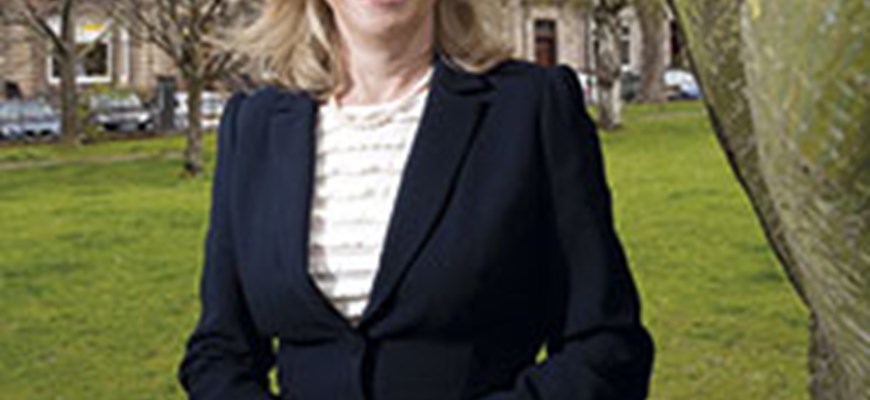
Next year’s practising certificate fee remains the same for the seventh year; the practice rules were amended to replace rule C3 on the provision of civil legal aid; new articles 14 and 15 of the constitution concerning voting at the annual general meeting, and office bearers, were approved, all without debate.
Donald Reid of Mitchells Roberton took the opportunity to raise a number of concerns arising from the decision to move the Master Policy brokerage contract from Marsh to Lockton (click here for the Society’s full explanation). That apart, there was little to excite controversy at this year’s AGM of the Law Society of Scotland, except perhaps the outgoing President’s comment – immediately denied – that there was nothing she would rather do on her birthday!
Such meetings, however, are also a time for taking stock, and the President and chief executive both took the chance to recall some of the highlights of the year and review where the Society is now on its ongoing journey.
Real highlights
For Christine McLintock there were some obvious highlights: launching the Leading Legal Excellence strategy; the office move to Atria One (easily able to accommodate the meeting); the profession becoming majority female (and “I cannot wait to get another photo of a woman up on [the presidential] wall outside”); and the announcement of the Lawscot Foundation, which will help those less advantaged with the financial burden of qualifying, as well as offering professional mentoring. Look out for the appeal for sponsorship.
Her own daughter’s experience as a Street Law volunteer tutor had also reinforced her in the view, set out in Leading Legal Excellence, “that the Society and the profession would benefit hugely from better engagement with our current and future members, and that it is not just qualified solicitors who can contribute enthusiasm and creativity to our work”.
Being President also involved visiting and meeting solicitors throughout Scotland. “Those Faculty visits weren’t always sweetness and light – on occasion some lively views were exchanged but, you know, that’s a good thing because that means that those there are still passionate and really care about the work that they do and the profession and clients that they serve. Long may that continue.
“And,” she concluded, “there is much for us all to be proud of within Scotland’s legal profession.”
Our chance at Holyrood
Chief executive Lorna Jack followed with an update on progress in delivering this year’s annual plan, after the six month mark. All 28 different projects were on track, she was pleased to say – going on to provide a more detailed report on the half dozen or so projects that the board regards as critical.
One of these is the legislative change programme. A “short window” in the Holyrood timetable may open in 2016-17 to allow new legislation on legal services and the legal profession, which the Society intends to “grab with both hands” to tackle the many problems and challenges with the existing collection of statutes regulating the profession. A detailed prospectus was presented to the Scottish Government in December, and meetings have been held with other interested parties to inform discussions with Justice Secretary Michael Matheson and his new ministerial colleague, Annabelle Ewing.
Other critical projects include reforming the post-qualifying accreditation system and the standards for those seeking extended rights of audience (consultations are in hand); membership growth, developing a new affiliate membership category for non-solicitors working in legal services; growth in commercial income, a key strategic goal which would help keep the PC fee low (“We’ve embarked on some ambitious business development work through new partnerships and sponsorship packages,” and have other plans relating to CPD, conferences and events); justice reform, including legal aid issues and the implementation of court reforms (more engagement with the Government and others, and now the campaign to defend legal aid and the current profitability survey of legal aid practitioners to support it).
The chief executive then noted the near-complete programme to issue smartcards, and work to establish future uses of the card. She thanked Marsh “for the great working relationship we have had”; and she thanked the Society’s staff team and committee volunteers “who have positively engaged in change themselves this past year… I am immensely proud of what you achieve every day and positively excited about what more we can do together, for the membership and public we serve”.
In this issue
- Brexit: a brand new world
- Plans reports: an evolving scene
- Law and IT: time for a new blend
- Care proceedings, the EU and foreign nationals
- Reading for pleasure
- Opinion: Simon Di Rollo
- Book reviews
- Profile
- President's column
- Coming down the line
- People on the move
- Litigation value and risk analysis
- Views of the gender gap
- Procurement: the twin track approach
- Wills: beware bank raids
- PSLs: no poor relations
- Sanctions: the holy grail
- DNA: how conclusive?
- Restoration riddle
- Tenant farming: the first guidance
- On a sticky wicket
- Looking forward, looking back: developments in anti-doping
- Scottish Solicitors' Discipline Tribunal
- Additional support needs and age criteria
- Paralegal pointers
- Where law and politics meet
- Marsh: why the axe?
- Law reform roundup
- From the Brussels office
- New framework: watch this space
- Lost horizons?
- Payment frauds: the fight goes on
- Ask Ash
- SYLA: the year in focus
- New wind in the sails







